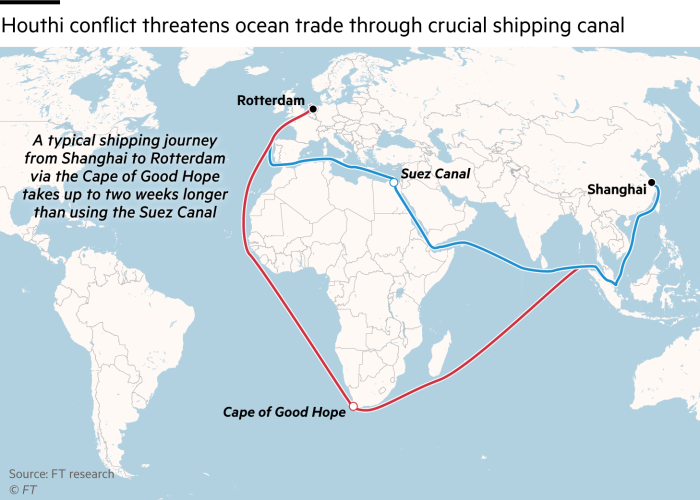US and UK airstrikes have reduced the risk to ships of attacks by Yemen’s Houthis in the Red Sea, but there is little prospect of many shipping companies making a quick return to the Suez Canal, experts said security and a senior manager.
They made the assessment amid a slowdown in missile launches by the Houthis, who say they are targeting commercial ships in solidarity with Palestinians in Gaza.
The militant group has launched only four notable attacks against ships since January 26: one on January 31, two on February 6 and one on February 12. In all but the most recent attacks, the missiles failed to even hit the ship.
The frequency of Houthi attacks has dropped significantly since U.S. and British forces began near-daily strikes on Jan. 11 on the group’s missile launch sites and aerial and maritime drone capabilities.
The Houthis, who have the support of Iran, launched numerous attacks in November, December and January, including seizing the Galaxy Leader on November 19 and transporting the cargo ship and its crew to a Yemeni port. On January 26, they started a serious fire on the Marlin Luanda, a fuel tanker operating on behalf of commodities trader Trafigura.
The recent truce prompted British Defense Secretary Grant Shapps to declare in the House of Commons last week that attacks on ships had become “less sophisticated and more sporadic” following the bombing campaign.
However, the continued reluctance of many shipping companies to sail through the waters off Yemen has raised questions about what changing conditions might prompt shipping companies to start challenging the area, which is the gateway to the Canal of Suez, strategically vital.
They instead used the much longer and more expensive route between Europe and Asia via the Cape of Good Hope.
Jon Gahagan, president of maritime security firm Sedna Global, said the airstrike campaign appeared to have “degraded” the Houthis’ ability to launch frequent attacks.
But he added: “Although the pace of attacks has decreased, the threat to shipping remains.”
Jakob Larsen, head of maritime security for Bimco, an international shipowners’ association, said he doubted whether it was “realistic” that the US-UK coalition could completely eliminate the Houthi threat.
“We are concerned that it is still possible for the Houthis to attack and target ships,” Larsen said. “Although their ability to do so has been reduced, most shipping companies recognize that the threat has not been removed or neutralized.”

According to data from Clarksons, the London-based shipping company, container ship arrivals in the Gulf of Aden in the week ending February 5 were 92% lower than the average for the first half of December.
Motor carrier arrivals fell 91%, while overall traffic through the region fell 73%. The figures show no drift towards the Red Sea.
Even recent, relatively modest attacks have given rise to new diversions. France’s CMA CGM, the world’s third-largest container shipping company, announced on Feb. 5 that it would suspend transits in the region after missiles were fired at a ship operating one of its services. The line was one of the few major international container lines still sailing in the area.
The missiles fell into the sea without any damage, as did those launched on February 6 from the Star Nasia, a bulk cargo ship. A missile fired Feb. 6 from the Morning Tide, a general cargo ship, flew over the ship’s deck but caused only minor damage. Reports on February 12 said missiles had been fired at a Greek-owned bulk carrier in two separate incidents and that one hit.
Jan Rindbo, chief executive of Norden, a Copenhagen-based operator of nearly 500 bulk carriers and oil product tankers, said only a long pause in attacks would prompt shipowners to re-examine options for the Red Sea.
“It would take a prolonged period of stability without attacks in the region and then we will start making those assessments again.”
Larsen pointed out that some shipping companies continue to use the Suez route. Among the companies that have stuck to traditional routes are some Chinese container companies, which appear confident that close ties between China and Houthi supporters in Iran make them immune to attacks.
“If the Houthis say they will no longer attack ships, I think many shipping companies will resume transit through the Gulf of Aden and the Red Sea,” Larsen said.
Another possibility, he added, is that the attacks could cease, without a clear signal from the Houthis. “You will see more and ships passing through, but only a little later,” Larsen said of such a scenario. “It will be a gradual increase.”
Gahagan, however, said the Houthis still want to target international shipping, attributing the decline in attacks partly to the reduction of ships with connections to Israel, the United Kingdom and the United States in waters off Yemen.
There remains a risk that coalition forces will miss a Houthi missile fired at a ship and cause serious damage, he added.
“Unfortunately, as with all terrorist incidents, the Houthis only have to succeed once, while the coalition naval force and other navies in the region must always be vigilant,” Gahagan said.
Additional reporting by John Paul Rathbone
